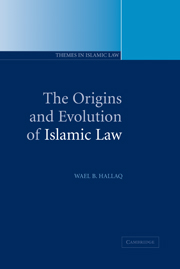Book contents
- Frontmatter
- Contents
- Maps
- Map 1 Arabia ca. 622 ad
- Map 2 Muslims lands in the third/ninth century
- Introduction
- 1 The pre-Islamic Near East, Muḥammad and Quranic law
- 2 The emergence of an Islamic legal ethic
- 3 The early judges, legal specialists and the search for religious authority
- 4 The judiciary coming of age
- 5 Prophetic authority and the modification of legal reasoning
- 6 Legal theory expounded
- 7 The formation of legal schools
- 8 Law and politics: caliphs, judges and jurists
- Conclusion
- Glossary of key terms
- Short biographies
- Bibliography
- Suggested further reading
- Index
5 - Prophetic authority and the modification of legal reasoning
Published online by Cambridge University Press: 05 June 2012
- Frontmatter
- Contents
- Maps
- Map 1 Arabia ca. 622 ad
- Map 2 Muslims lands in the third/ninth century
- Introduction
- 1 The pre-Islamic Near East, Muḥammad and Quranic law
- 2 The emergence of an Islamic legal ethic
- 3 The early judges, legal specialists and the search for religious authority
- 4 The judiciary coming of age
- 5 Prophetic authority and the modification of legal reasoning
- 6 Legal theory expounded
- 7 The formation of legal schools
- 8 Law and politics: caliphs, judges and jurists
- Conclusion
- Glossary of key terms
- Short biographies
- Bibliography
- Suggested further reading
- Index
Summary
SUNNAIC PRACTICE VS. PROPHETIC ḤADĪTH
It is by now clear that during most of the first century h, the concept of Prophetic Sunna was part and parcel of the sunan, i.e., instances of model, binding precedent established by a long list of venerated predecessors. References to sunna and sunna māḍiya were not always made with the Prophet alone in mind; it was not infrequently the case that other sunna founders were, as individuals, the point of such references. Nor was it unusual for sunna to refer to the collective conduct of individuals belonging to successive generations, it being assumed that they were all prominent figures who had, by their actions, sanctioned an earlier sunna and thereby bestowed their authoritative approval on it. As we have seen, the Prophet himself became the ultimate source of otherwise ancient Arabian sunan by virtue of the fact that he merely adopted them (later on, this became the third sub-type of Prophetic Sunna, known as “tacit approval”; the other two were based on the Prophet's own statements and actions, respectively). In other words, in the Muslim tradition, Muḥammad became the initiator of a multitude of sunan that were ultimately disconnected from their pre-Islamic past to form an integral part of Prophetic Sunna.
- Type
- Chapter
- Information
- The Origins and Evolution of Islamic Law , pp. 102 - 121Publisher: Cambridge University PressPrint publication year: 2004



